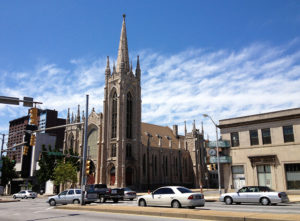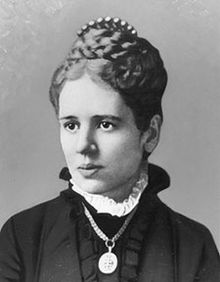The Southern Baptist church where Annie Armstrong was baptized is at risk of being evicted, according to an investigative story by the Baltimore Sun.
Seventh Metro Church in Baltimore, formerly known as Seventh Baptist Church, wound up in tax auction over $6,000 in unpaid water bills. A California investor who bought the debt is now seeking to foreclose on the property assessed at $1.4 million with plans to rent or sell it to a pastor who will fill the pews.

Seventh Metro Church
“We are in a rare position where we have the building without the members,” churchgoer Sterlin Miller said in a video sidebar. “I don’t think that it’s God’s will that someone else would come in and occupy this space and not be connected with the community that it serves.”
Founded in 1845, Seventh Baptist Church in its heyday boasted some 2,000 members. By the time current pastor Ryan Palmer came along in 2003, the congregation had dwindled to 17 souls, prompting a relaunch as Seventh Metro the Sunday before the Southern Baptist Convention met in Baltimore in 2014.
Palmer’s mentor, Louisiana pastor Fred Luter, preached the service as one of the last sermons of his term as Southern Baptist Convention president. A team of 44 students from Liberty University Baptist Theological Seminary put on a block party that drew about 700 people from the downtown Baltimore area as part of Crossover, an annual evangelistic event held the weekend prior to the SBC annual meeting in host cities since 1989.
Now, according to the article, time is running out for the struggling congregation to come up with the money to pay off the debt, plus interest and the investor’s legal fees, or get out of the building.
“It’s not the ninth hour,” Palmer told the congregation in a recent sermon. “It’s the eleventh hour.”
According to a history of Maryland Baptists published in 2000 and written by McAfee School of Theology professor Loyd Allen, Seventh Baptist Church got its start in a rift over church governance at First Baptist Church, founded in 1785.
Seventh’s first pastor, Richard Fuller, third president of the Southern Baptist Convention, accepted the call to move to Baltimore from Beaufort, S.C., in 1846, contingent on the building of a new meeting house. He delayed his arrival until the new building opened in the summer of 1847.

Annie Armstrong
In 1869, Fuller baptized a 19-yeara-old Annie Armstrong, who became first executive secretary of Woman’s Missionary Union and namesake of an annual SBC offering for North American missions.
Two years later both Armstrong and Fuller were among 133 members of the Seventh Baptist Church who resolved “to separate in a friendly manner” to form a new church called Eutaw Place Baptist Church. Both remained at Eutaw Place the rest of their lives. “Miss Annie,” as she was called, taught the Sunday school class for children up to age 12 for 50 years. The congregation, now known as Woodbrook Baptist Church, today identifies with the Alliance of Baptists.
Remaining downtown when many churches left for the suburbs during the so-called white flight in the mid-20th century, Seventh Baptist shifted its focus to community ministries, including the St. Paul Project, a series of row houses for the elderly and indigent purchased in the 1970s, and a ministry to provide medical care to uninsured persons named Shepherd’s Clinic opened in 1994.
Since the relaunch, Seventh Metro escaped violence from a nearby hot spot in riots following the death of Freddie Gray while in police custody in 2015. Palmer gave God credit for protecting his church campus.
“Literally, the violence was a few blocks west and a few blocks east,” the pastor told Baptist Press. “In both cases, you could see the steeple of our church from the locations, but they did not come into our block. … We’re giving God praise and thanks for that.”
Churches are exempt from paying property taxes, but not from their water bill. In a system dating back at least to the 19th century, Baltimore attempts to recover unpaid property taxes, water bills and other charges by offering the debt at auction.
Investors pay the amount due to the city and then attempt to collect it themselves, with interest, from the property’s owner. If not paid, they can foreclose on the property.
According to Baltimore Sun, Seventh Metro is one of more than 25 predominantly African-American churches with liens purchased in the city’s annual tax auction by California investor Christopher Bryan, most of them in disrepair and some not being used at all.
“Everybody wins with an active church,” Bryan told the newspaper. “A derelict church benefits no one.”
